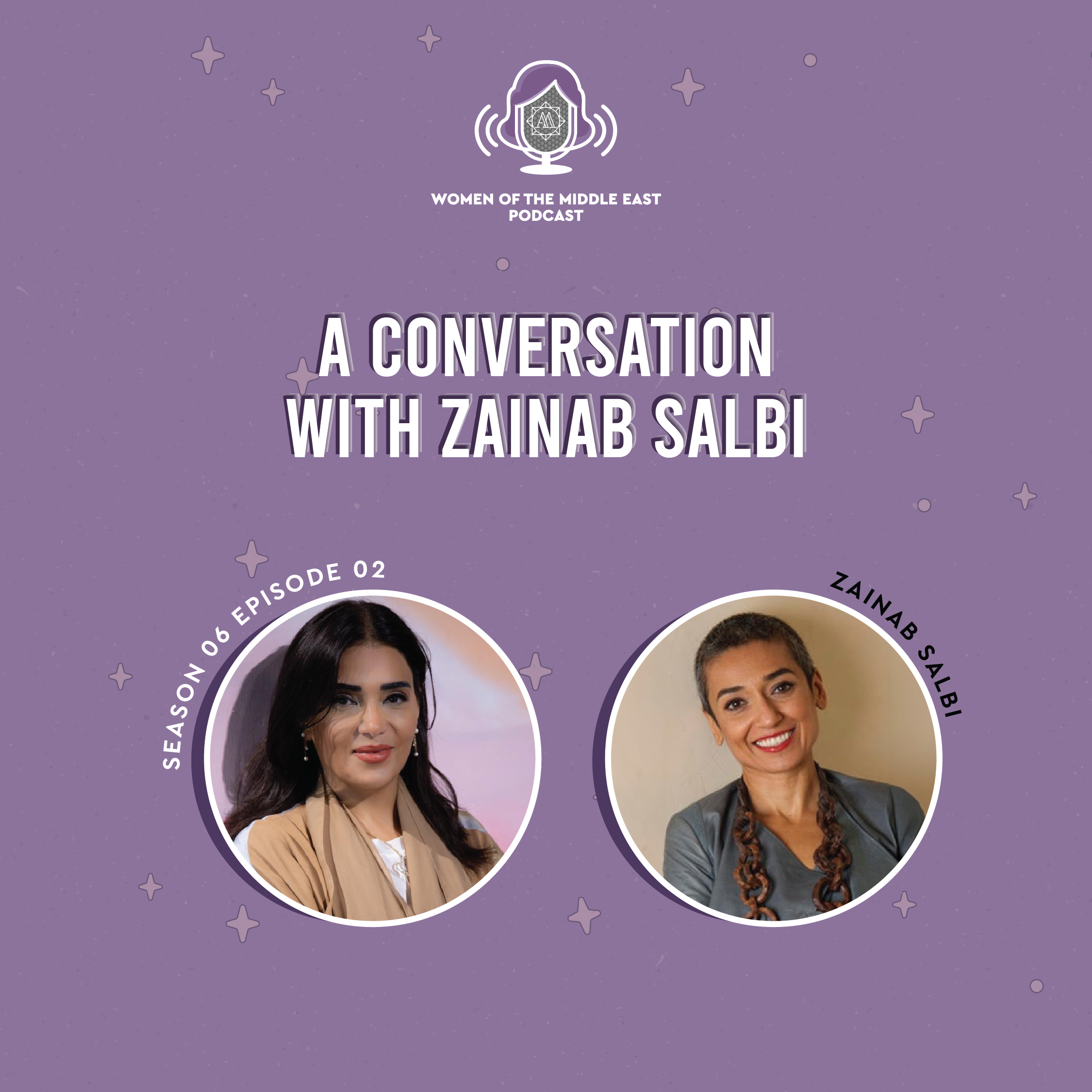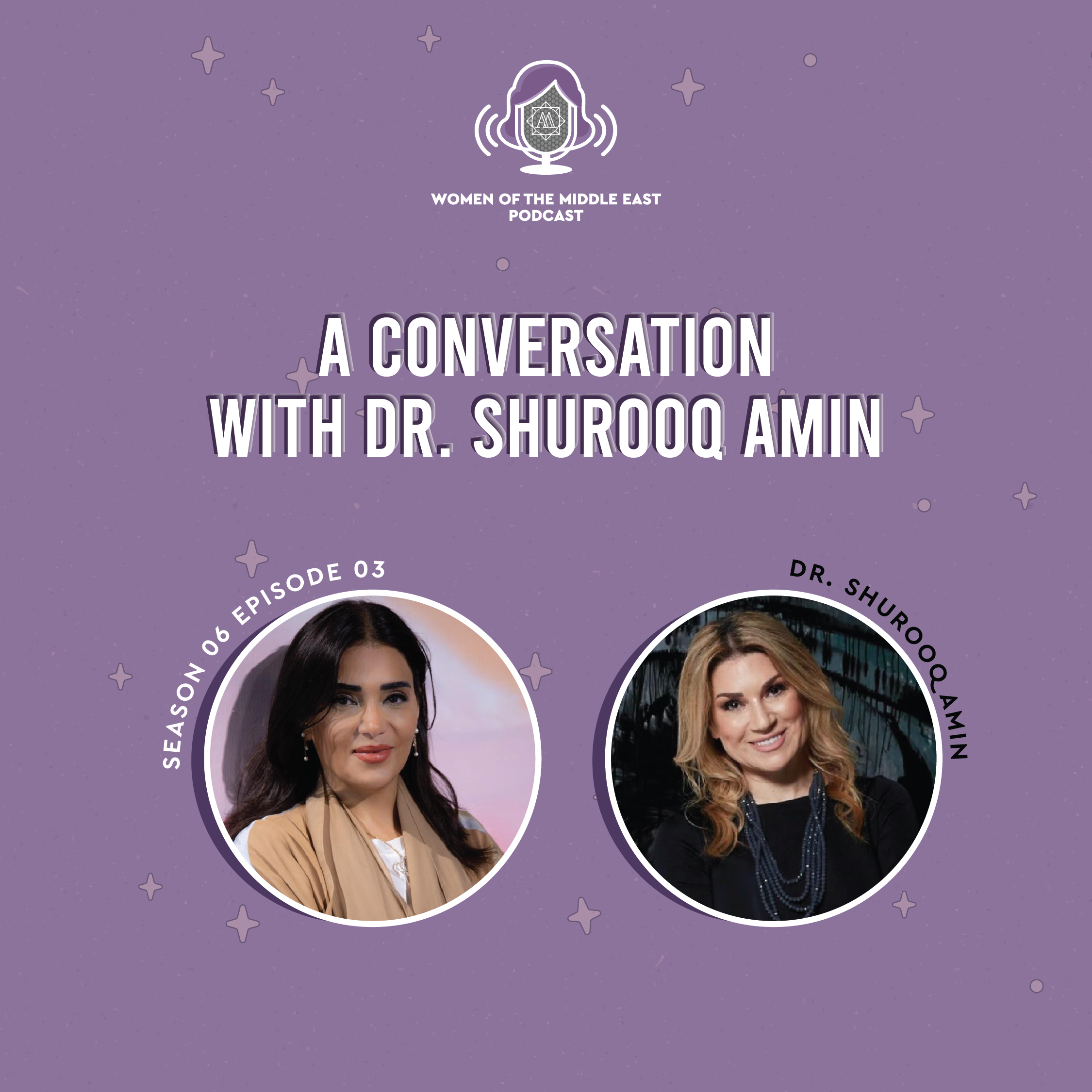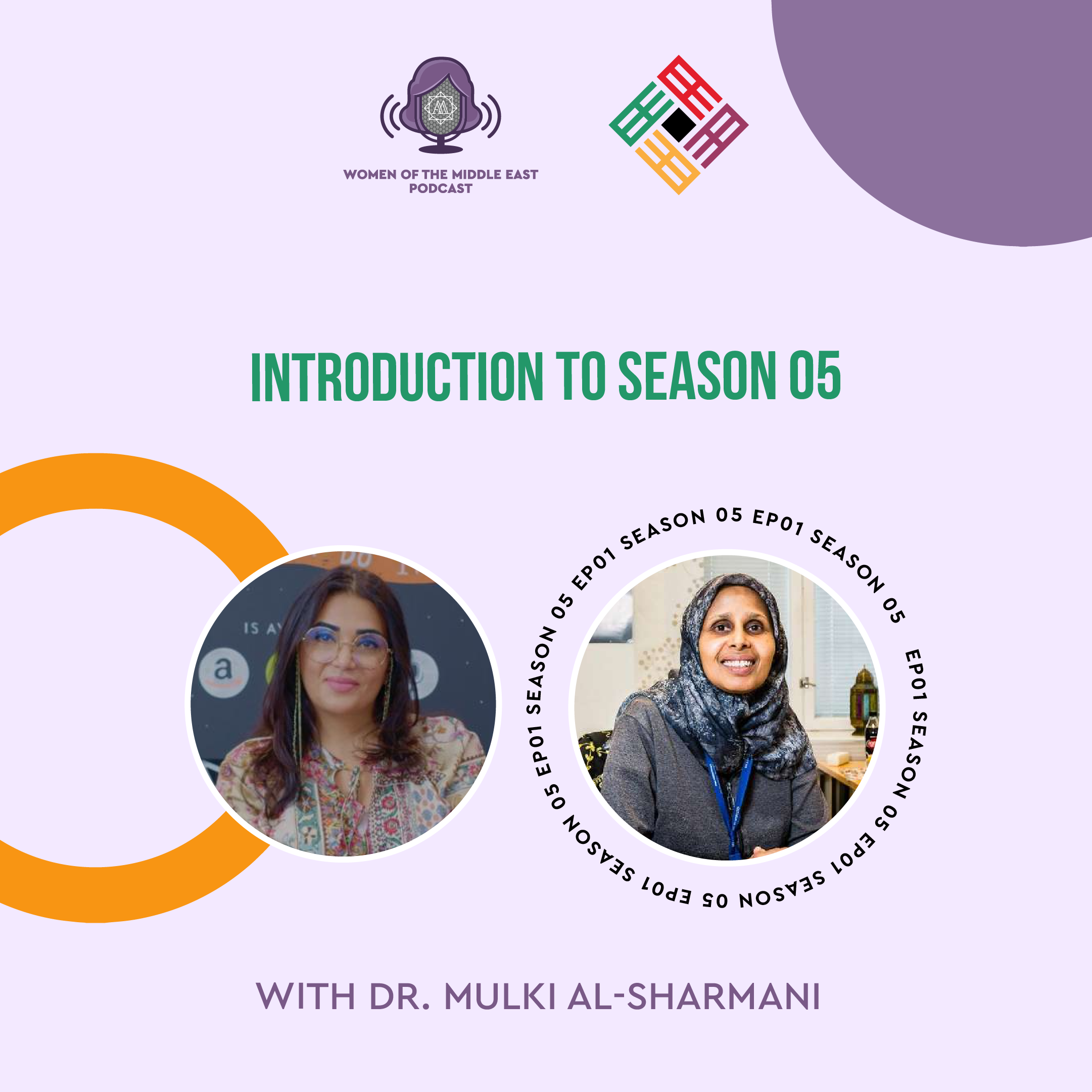Episode Transcript
Speaker 1 00:00:04 Hello and welcome to Woman of the Middle East Podcast. This podcast relates the realities of Arab woman and the rich and diverse experiences. It aims to present the multiplicity of women's voices, and it wishes to break cultural stereotypes about women of the Middle East, as well as educate and empower the younger generation of Middle Eastern women who were stripped off their historical reference and weren't necessarily raised to believe in their agency and power to create their own destiny. Um, I'm a malki. I'm a feminist scholar and educator. I'm also the author of Arab Woman in Arab News, All stereotypes and new Media. I created this podcast to be an extension and an update of the book and its main topics.
Speaker 1 00:00:53 Hello and welcome to a Woman of the Middle East podcast. I record this episode, which is episode 11 in a small cottage above Draven and Croatia, hoping that you're all fine and safe as the world takes its breath between different variants of Covid 19. I wanted to take a short break before we start a new academic year, not knowing what the new normal will be. In this episode, I continue bringing to you some of the talks from Empower Now Online forum, uh, that took place online, uh, in March, 2021. Uh, that presented the collage of women leaders, experts, and business owners who have shared their experiences and expertise. Um, as I told you last time, I was one of the speakers, uh, and today we, uh, have a second intervention by Vida Anani, who is, uh, from Lebanon. She's an assistant professor and the faculty of public health at the Lebanese, uh, University.
Speaker 1 00:01:56 As an expert in gender-based violence and child protection, a nanny has published a number of studies, articles, training kits and community educational materials on gender based violence and child sexual abuse in Lebanon and M region. In June, 2011, she founded and continues to manage a bad or about a B double, a d resource Center for Gender Equality, which was awarded the Womanity Award. In 2014, Anani received the Woman Leadership Achievement Award by the World Woman Leadership Congress. She has led a number of public opinion campaigns, notably the latest, um, which is hashtag undress 522, Undress 5 22, which resulted in a historical parliamentary, uh, vote. Uh, repealing Article 5 22 from the Lebanese Pen Code. Now, Article 5 22 of the penal code is a law and Lo and Lebanon exonerated, which exonerated, uh, the rapist if he marries his victims. So basically, if a rapist marries, uh, his victim, uh, he gets away with it.
Speaker 2 00:03:18 I'd love to hear more about your activities and know more about ABBA and, uh, this very, very interesting topic. So the stage is yours.
Speaker 3 00:03:27 Thank you so much, Ms. Hanan, and, uh, thank you actually for having me as part of this amazing, uh, innovative, uh, I would say social like, uh, opportunity to meet, uh, and, and exchange lots of learning with many, many, like really inspiring, uh, <inaudible> and activist, uh, in the field. Precisely a bad, uh, stands for dimension, and it's the, um, it's reflective of the, the model of intervention that we are adopting in, uh, in our operation and our work. So when I started a ad in 2011, it was in the philosophy of establishing, uh, a model, uh, civil society organization that adopt, uh, in practice the multi-sectoral and multi-systemic approach, uh, with mainstream, uh, gender sensitive human right based approach and also, uh, people led approach. So in a, in a sense, we believe that, uh, as each word has, uh, its dimension, uh, each behavior, uh, there is multi causality, uh, and multidimensional causality that is contributing to, uh, enhancing the probability, uh, of having gender based violence as well as the intervention, uh, as a solution. It needs as well to be multidimensional, uh, multidisciplinary, uh, using and tapping on the multiple layers of the system, the multi, um, um, root causes of what is contributing to the dynamic of G B D. And he tapping on that in, in, in, in the way of operationalizing the model, maybe aha is among the very, very few, if not rare,
Speaker 2 00:05:17 Both men and women. And, uh, so going back to the topic of gender based violence, which I think it's, its, um, it's really important topic to, to shed the light on and bringing it more to context of today. And, and we know that the crisis we're being dealing with and still are battling with has definitely shown, uh, more exposed, more gender, uh, gender based, uh, violence, domestic violence, and a lot of reports have shown increase, and not just in Middle East and in Arab country, but even in western countries. So if I may ask, what do you think is the reality today about this, um, this context of 19 crisis, a domestic violence
Speaker 3 00:06:00 Increase? Yeah, so unfortunately, usually in each, uh, emergency being like an actual disaster or manmade emergency, like, uh, uh, armed conflict or even health like, uh, pandemic always, uh, women and girls are the most vulnerable in the equation, and they have a part of, uh, of it. And of course, Covid 19 was no, was no exception, uh, because of the dominating patriarchy that is governing, um, like most, most of the, most of countries, but especially also in the minor region and the Lebanon specifically. So we have this already mentality, uh, and we have this, the social norms of patriarchy that are really governing the relationship dynamic, and that is also deeply rooted in our policies and enhance our legislations and our daily practice of what is okay, what is not. Okay. So during the pandemic, uh, already, uh, domestic violence was, uh, was a kind of, uh, predominant in, uh, uh, unfortunately in Lebanon, we don't have representative data in general.
Speaker 3 00:07:08 We don't know the size of the population anyway for multiple social or social political reasons. So, but, but what is, what was evident that already it was affecting the life of women and girls through the reported numbers to NGOs, to the police or in the media, Uh, then with the start of the lockdown, of course, that multiplied, uh, by double and triple, even during a period of time, it was an increase of 100% of the reported cases to the police, uh, to the security forces, as well as to NGOs doing the triangulation of data of the numbers. It was really alarming that those that had predisposition of using violence in the relationship, the pandemic, and being Larner with all the patriarchy mentality, the shift and the gender rule, who was support, uh, and then the increase of pressure, uh, that was on, on women as well, on men, uh, possibly being the bread earner, being the one, bringing the food to the table, being the one taking decisions.
Speaker 3 00:08:16 So this, this kind of, um, conflict, spousal conflict that was already there, couples who were not solving regularly in non-violent way, their, their differences or their, uh, their fights or their issues immediately with the lockdown, that was an, an explosive, um, factor that made the violence like really being the way of communicating or the way of just bringing the quote unquote the stress out there, uh, on the wife or on the kids as well as some of the violence. So the reality was like really alarming on the level of magnitude of the problem. But also one of the major problem was accessibility to the service. So, and the women really knowing that lockdown, uh, there are, there is no interruption of life saving services being provided, and that is my dear, just because still the mentality is as if gender based violence is not a public health issue, right?
Speaker 3 00:09:19 And dissociating that from the health response was a key problem despite being a major protection con, uh, uh, protection concern. But when it comes to emergency response plan, it should have been integrated and mainstreamed as part of the health response as in different countries. But because of like not, we are not still defining, considering and treating gender based violence as a major public health problem, in addition to being a violation of human rights and like where the real gap happened in sense of women not knowing about availability after services, governmental, like, you know, measures. We're not taking into account how women can still access the service with interruption of, um, the what was actually also combined with the banking, uh, banking problems. So access to cash to be able to go around was challenging. We don't have public transportation system. There are no way for the woman to go out there, have some money in hand, have a mean of safe, mean of transportation to be able to go and get support from counseling units.
Speaker 3 00:10:28 So that was that. In addition to last, lastly, absence of a unified free of charge complain mechanism, complaint system of having a national hotline in all countries. We always have a kind of three digit to free of charge number where any woman can call, uh, asking support and life threatening situation. And Lebanon hotlines are managed by social society. Mainly. It's a mobile number. We know how much is expensive, the telecom. So having a way for the women to communicate, uh, it was one of the key challenges as well. Yeah. Um, because of inability of that mechanism. So the last resort was using all social media platforms? Yeah. So what we witnessed is that the shift of women to, uh, use of inbox and Instagram and, uh, on Facebook, uh, using WhatsApp, even sending emails as a modality to safely to safely communicate, uh, and also, uh, without an additional cost with all the crisis that was really, um, intersectional and, uh, exaggerated y in a, in a sense.
Speaker 2 00:11:40 Yeah, I agree. Thank you that that answers my question that was anticipated about the challenges and the gaps, Uh, unless you want to have more, uh, that are in this, um, more, uh, specifically since you're active there. And, uh, I'm curious to know about some innovative ways, uh, or innovative interventions that ABAD has come up or done to address this, this really major problem.
Speaker 3 00:12:05 Yeah, so basically just, uh, maybe lastly to add on the gaps was as well non readiness of ministries that are supposedly under the principle of due diligence, which is state responsibility to respond and support, uh, survivors. Basically. Um, there, there, there is like a kind of missing, uh, prioritization or missing response plans, especially in secal, meaning on the level of the Ministry of Interior, Ministry of Justice, Ministry of Social Affairs, Ministry of, uh, as well as woman machinery, basically. Um, despite the fact that Lebanon today has a national, uh, g bv, F O p, which is standard operational procedures, endorsed, led, um, by, by the Ministry of Social Affair, but yet it was not operationalized at the time of the pandemic. It was a newly released system, uh, that requires some testing, pilot testing and operationalization, and when, when the, when the lockdown started, it's a kind of vacuum on the level of different sectors that are usually, um, the frontliners.
Speaker 3 00:13:14 So if I today have faced any form of, of violence, so I either I would go to the police or I would go to a emergency room in, in a hospital, or I would go to a social, um, social community center counseling unit, or I would go to see a lawyer, a judge. So this is usually the defense mechanism. These are frontliners supposedly in time of emergency to have like, to shift to a preparedness of, uh, um, uh, shovel them like a kind of first aid. Uh, so it's a kind of, um, contingency as if you are in a time of war. So you shift to that mood. So one of the key gaps as well was absence of preparedness on who to do what and how at the time of exceptions, such as the pandemic. So what we tried to do is to, to, to, to think out of the box most importantly because we shifted to mobile, uh, mobile service delivery.
Speaker 3 00:14:15 So for Abara, we never stop one day of providing the services, actually the large saving services and our shelters. We, we were still accommodating women. We found a, an alternative of having midway apartments where the women can go and quarantine, uh, so without like really, uh, really feeling that, um, we would say no to any woman as well as to, um, enhance the accessibility and promote the availability of the service. So we did a quick campaign, which was called Lock Down, Not Lock Up. We asked people from where they are on, on their balcony to have a white blanket actually and write down the, um, hotline number of a bad, or maybe to the police or any other organizations they wish to do with a solidarity message. So women behind lock doors would know in that neighborhood, like it's an act of solidarity, but as well promoting the number as well as breaking the isolation the women are living in and let them know that it's there.
Speaker 3 00:15:18 And the municipality joined in that effort in having like white banners in different areas. And we were able to have a digital campaign as well, promoting through camouflage messages, you with a support of influentials on Instagram, uh, also like videos, um, repeating and overly like really promoting, especially the Safeline number of about 8 1 7 8 8 1 7 8 in a very, in, uh, in negative way. So that was one example, um, of what we tried to do. And that helped in, in having more than 150 call in one week from, uh, from women who are actually facing that challenge and not able to, uh, uh, were not like actually seeking support or speaking to anyone, uh, to ask for advice of what is possible in their, in their situation.
Speaker 2 00:16:07 Amazing. Wow. That's, that's really, I, I think, I always think that crisis sometimes sparks innovation and sense of urgency does spark innovation. I, I want to for, for being there, for creating something like a bad that is creating these safe ways, safe spaces for women and light on such an important topic that is really alarming, that is impact billions of women. Yeah. And it's, it's still hidden. Thank you so much, uh, Liani for intervention. It was a great pleasure having you with us today. Thank you.
Speaker 3 00:16:38 Thank you. Thank you.
Speaker 1 00:16:49 And the next episode, I will share with you the third intervention and the social impact session from which I have already shared the videos and my talk. The third intervention will be by Rita Hay, who will be talking about at the front lines leading the battle against Covid 19. Until then, I'm gathering the questions you're asking and will dedicate an episode to answer. So send me any question you have about the scholarship on women in the Middle East Arab, or Muslim woman, or even questions you have for me. Also, for those who have asked for a live episode, I will certainly think about it and will let you know soon. Don't forget, you can always email me or contact me via social media. All things would be shared with you. Until then, take care and stay safe.


